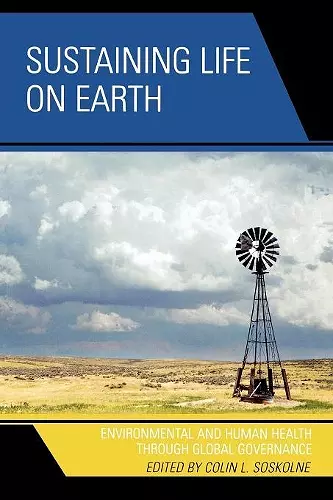Sustaining Life on Earth
Environmental and Human Health through Global Governance
Laura Westra editor Louis J Kotzé editor Colin L Soskolne editor Brendan Mackey editor William E Rees editor
Format:Paperback
Publisher:Lexington Books
Published:29th Oct '07
Currently unavailable, and unfortunately no date known when it will be back

As global warming, famine, and environmental catastrophes have become daily news items, achieving a sustainable environment to maintain the future of life on Earth has become a global concern. Sustaining Life on Earth is an important contribution toward assessing such problems and making the Earth hospitable to life for generations to come. With an interdisciplinary team of international scholars, this masterfully edited collection approaches the problems facing sustainability from a perspective of global governance. To date, powerful economic forces have misguided decision-making processes in favor of short-term gain rather than long-term sustainability. As global awareness has increased and individual citizens have begun to alter their lifestyles to be more environmentally conscious, it is also necessary for governing bodies to take these concerns seriously. Sustaining Life on Earth makes the case that, for all the recent neo-liberal emphasis on the autonomous individual, humanity has collective problems, and it is only through collective action that solutions will be found. It shows that the global community is beginning to acknowledge the interdependencies among population, affluence, and technology. In the book, analysts from many disciplines advance solutions that could shift us away from growth-bound status quo development approaches toward more ecologically responsible and socially equitable ways of living. They suggest ways to move forward that would ensure health and well-being for all in both present and future generations. While success necessarily entails many changes at all levels, the book highlights one soft-law instrument that reflects many of the values and principles necessary to set humanity onto a sustainable path: The Earth Charter of 2002. Sustaining Life on Earth is a ground-breaking contribution to the burgeoning study of sustainability. Designed for a general non-specialist readership in the first year of university or beyond, this book will be of interest to anyone concerned with the impacts of global change on human well-being and the ecosphere, including people in environmental NGOs and those working in public policy.
I plan to use this textbook in my seminar next spring, and look forward to studying it more deeply along with my students. It is a fine collection of subjects and authors. -- Herman E. Daly, Professor, School of Public Policy, University of Maryland, College Park, Maryland
This collection of state-of-the-art summaries of what ails planet earth offers prescriptions for the effective treatment, care and maintenance of the home we all share. Scientists and scholars from many disciplines and countries have collaborated to compile this timely statement of what we as individuals and as societies and nations must do about the precariously unstable state of the world’s life-support systems. In short, we need a system of global governance to deal effectively with environmental and ecosystem deterioration. The whole work is set out clearly and concisely in language accessible to non-specialists, and is supported by rich reference lists to guide concerned readers towards sources of further information. This book should be on the high priority list of required reading for everyone who is concerned about the world and its future. -- John M Last, MD, Emeritus professor of epidemiology, University of Ottawa
For those who still believe that we can have our current lifestyles based on the current model of unlimited growth, Sustaining Life on Earth is a revelation; for those who already know that we have hit the earth's limits, this book is a guide. Many thanks for this lovely but challenging collection. -- Maude Barlow, author of Blue Covenant: the Global Water Crisis and the Coming Battle for the Right to Water
This book is a powerful attempt to prove that human intelligence, and the institutions it has created, possess power enough to blunt the force of our ecological destructiveness. It provides a light for the path, one that is badly needed. -- Bill McKibben, author of "Radio Free Vermont"
This book needs to be read widely, discussed widely, and the Earth Charter needs to become as familiar today, as the Four Freedoms annunciated by Franklin D. Roosevelt was more than sixty years ago. -- Michael Gochfeld * European Journal Of Oncology, Vol. 12, No. 4 (2007) *
Like Cassandra of Troy, according to Homer's Iliad, experts in environmental matters—including biology, ecology, economics, law, public health and social sciences—have come together as 'doomsayers, destined to tell the truth, but never to be believed.' This book brings together experts from relevant disciplines and, under the shrewd pen of its editors, the text is distilled to read as if from a single author. The idea of bridging, and thereby reconnecting the role of humans and their institutions to the global ecology, is shown to be critical if solutions are to be found that will help us to preserve ecosystems and thus more ensure a sustainable future for human populations. Assembling such varied information from multiple authors is the very kind of contribution needed for policy-makers and students alike to help save us from ourselves. The contribution of this book to sustaining life on Earth is unique. Reading it is an enlightening experience and I strongly advise it to anybody. -- Roberto Bertollini, director, Special Programme on Health and Environment, World Health Organization (WHO) Regional Office for Europe
The Earth Charter is a declaration of values and principles for building a just, sustainable, and peaceful global society. -- Tracy Nichols, University of Alberta, School of Public Health
ISBN: 9780739117309
Dimensions: 229mm x 157mm x 34mm
Weight: 721g
482 pages